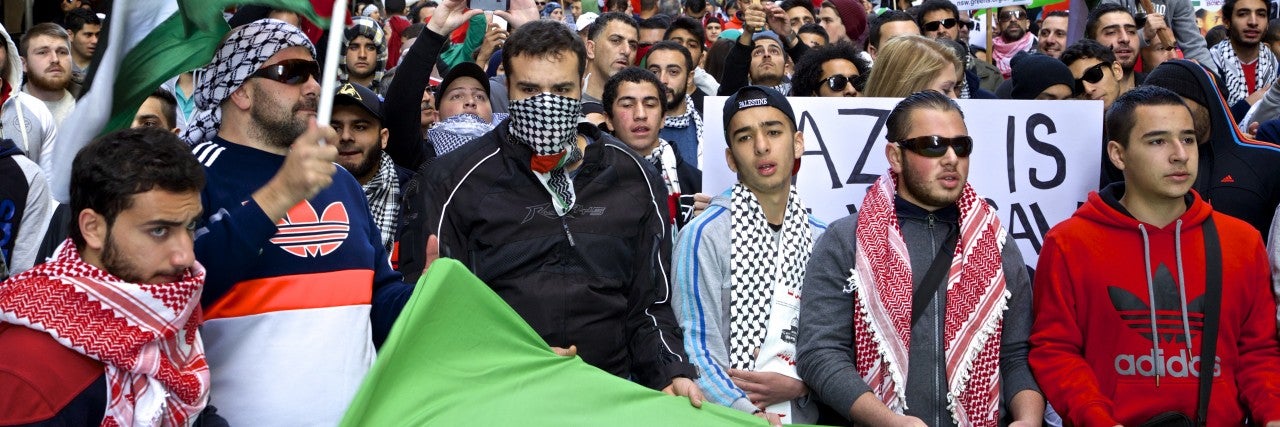March 13, 2018 — Jerusalem
By Eran Lerman
Is President Mahmoud Abbas nearing the end of his long tenure? Since Arafat's death in November 2004, he has been simultaneously president of the PA (or, by the Palestinian definition, of the Palestinian state), chairman of the PLO, and leader of the Fatah movement. In none of these roles can he point to a resounding achievement, or even a constructive step that might lead to future progress. He is not in the best of health. (He was recently at Johns Hopkins in Baltimore for treatment, and has reportedly been diagnosed with a heart condition and perhaps even stomach cancer.) He is angry with President Trump, frustrated with calls from some Arab leaders for compromise, and unwilling to walk back his visceral historic rejection of Zionism. His room for maneuver has narrowed greatly in recent months.
True, life is much better for most West Bank Palestinians than it was when he took power, and the misery in Gaza demonstrates that he has been able to deliver more for his people than Hamas ever has. Still, in a culture that values dealing setbacks to Israel high above any gains for the Palestinians, he had not been able to deliver on the promise of pushing Israel back to the 1967 lines, securing the right of return, and establishing Jerusalem as Palestine's capital – indeed, these goals appear more out of reach than ever.
Abbas may nevertheless cling to power for as long as he can, if only because he holds all other prospective leaders in low regard – and needs to worry about what his successor may decide to do about the riches amassed by members of his own family while he was in power. He is not likely to "give back the keys" to Israel and abandon the PA project altogether, but reports about his poor health and statements he is reported to have recently made indicating he is not sure he will be at the helm for much longer, are stirring up rumors about a struggle for succession, and the possibility that he may soon appoint a vice president who could step in if he goes.
That person, former mayor of Nablus Mahmoud al-Alul, is hardly known beyond the West Bank. He was appointed deputy leader of Fatah back in February 2017, and on March 4, 2018, was apparently chosen by the Fatah Revolutionary Council, in a closed session, as the designated temporary successor for a three-month period, if, indeed, Abbas would no longer be able to fulfill his duties. Alul, now 66, is a hardliner who recently raised questions about whether Fatah has ever really recognized the legitimacy of Israel, and his Facebook page contains calls for knifing attacks. He was deported to Jordan as a young man in 1971 for terrorist activity; was a military commander in Lebanon, involved in some of the battles against Israel; returned to Nablus after the Oslo agreement; and in recent years has been a loyal ally of Abbas in internal Palestinian politics. His son was killed in the second intifada.
Pushed aside (albeit appointed a secretary of the Central Committee of Fatah) was a much more colorful character, Jibril Rajoub, once the all-powerful head of the Palestinian Preventive Security in the West Bank, and more recently head of the highly popular Palestinian Soccer Association (a position he used to try get Israel ejected from FIFA), and chairman of the Olympic Committee and other semi-official bodies. Fluent in Hebrew, abrasive and domineering, but occasionally sober about the need to address the Israeli public, Rajoub saw himself as a power broker and a potential successor. By now, however, real power in security matters has passed to the new commander in the field, Majid Faraj, who does not hide his commitment to security cooperation with Israel, and leads a force trained by U.S. officers. Faraj may not harbor leadership ambitions of his own (yet?), but has no intention of finding himself subject to the whims of his arrogant predecessor.
Muhammad Dahlan, once Rajoub's rival in Gaza (back when we sometimes spoke of the two Palestinian fiefdoms as "Dahlanistan and Rajoubadesh") is now on the outs. Viscerally hated by Abbas, who would do anything he can to keep him away, Dahlan found support in the UAE and Egypt, dabbled in talks with Hamas in Gaza – the very same people who defeated him and killed his men back in 2007 – and tried to build a base of support in the West Bank, with little to show for his efforts. Some Israelis – such as Defense Minister Liberman – have toyed with the idea of supporting his bid for leadership: once upon a time he supported compromise with Israel (he would have become immensely rich if peace broke out, and he could have been free to steal everything he could out of the trade of Gaza). In 2000, however, he crossed the line back into terror, and then reversed again. He can hardly be described as reliable, and perhaps Liberman was just muttering his name to keep Abbas off balance.
Other Israelis have from time to time mentioned Marwan Bargouthi as a potential successor (and Fatah activists may still push in that direction), but he is serving five life sentences for murder, and given Israel's stance on rewarding terrorists – the Prime Minister has come out in unequivocal support of the Taylor Force Act – it is difficult to see any Israeli government setting him free so he could take up his duties as leader. Moreover, those who came to know him during his years in jail come away "underwhelmed." To put it mildly, a Mandela he is not.
There could, of course, be chaos after Abbas, and a bid by Hamas to take over (if Alul is not formally appointed vice president, the next in line is supposedly the speaker of the Palestinian Parliament – a Hamas activist still in jail). Polls indicate that Hamas may still be more popular than Fatah in the West Bank. (In Gaza, there are signs that the population is getting sick and tired of Hamas rule, but this cannot come into political expression.) Elections could be dangerous. Still, given that the security forces would fear for their lives if Hamas took over – and their ability, in close cooperation with the IDF and the Shin Bet, to foil violent designs aimed at destabilizing the West Bank – it is safe to assume that they will act decisively to prevent this from happening.
The attempt to assassinate both Faraj and PA Prime Minister Rami Hamdallah in Gaza can serve as a rude wake-up call to all who expected the transition period to be orderly. While Faraj placed the blame – as Israel does for every rocket fired from Gaza – on Hamas, as the de facto government there, rumors swirled as to who may be behind it: Dahlan? Vengeful Hamas and PIJ elements with accounts to settle? Jihadi Salafists? One thing is certain: the attack only serves to confirm that the key to the transition and the succession is indeed with the PA security forces.
Thus, at the political level, what we end up facing in Ramallah is a weak, divided leadership driven to radical positions by internal rivalries. (On the other hand, this is what everyone thought would happen in Egypt when Sadat took over in 1970.) There does not seem to be much that Israel or the U.S. can do to reach a better outcome, and no amount of "sweeteners" thrown in by the American team, as it puts the final touches on an administration peace plan, will bring about a different outcome. The "deal of the century" may therefore need to wait, "on the shelf," until a younger, more effective and more flexible generation takes over at key positions and can honestly look at the necessary compromises.
Until then, what Israel will need to apply – both in the West Bank and vis-à-vis Gaza – is a sobering dose of sophisticated conflict management. It would be best if Israel would avoid provocative political actions such as partial annexations. Meanwhile, the U.S. administration should focus on shoring up the Palestinian security forces, and on making the rising crop of younger Palestinian "influentials" acutely aware of what they can legitimately expect (a workable two-state solution with territorial contiguity) and what not (total withdrawal with minimal swaps; the majority of settlers uprooted; some recognition of the "right of return," carving up the living city of Jerusalem). This would establish a new paradigm for a new generation of leaders.
Eran Lerman is the former deputy for foreign policy and international affairs at the National Security Council in the Israeli Prime Minister's Office. Prior to that, he served as director of AJC Jerusalem.


